Father-Son Team Helps Youngsters Discover—Engineering Is Cool
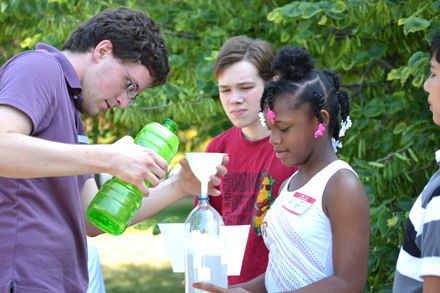
Drew Coverdill (left) and campers filling bottle rocket prior to launch.
August 8, 2012
The temperatures weren't the only thing that soared during University Laboratory High School's Summer Enrichment Camp 2012. In a session on aeronautical engineering taught by a local father and son team, some middle school students got a chance to fly gliders they constructed themselves. Despite the hot temperatures, they found out engineering can be cool.
The first week of July, Bob Coverdill, I-STEM's Associate Director, and his son, Drew, took some time out of their busy schedules to share their love of engineering with a group of rising 5th and 6th graders. In addition to learning physics principles about how and why a plane flies and aeronautics principles about airplane design, the youngsters made tissue and balsa model airplanes, then got a chance to test them to see if they would fly. They did. The youngsters also helped launch a number of different bottle rockets and were treated to a demonstration of radio-controlled model airplanes and helicopters by Greg Elliott of the Aeronautical Engineering Department.
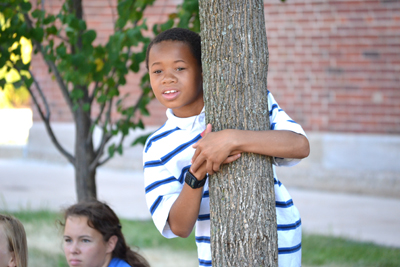
Future aeronautics engineer watches during a demonstration of radio-controlled models in flight.
The two Coverdills worked well together —like a well-oiled machine—with each doing his part. Son Drew took care of the planning, made sure they could build the planes in the allotted amount of time, and figured out what they were going to talk about and look at. His father, Bob, according to Drew, "spontaneously generated lessons out of mid-air."
Hoping to get the lowdown on a colleague, this reporter asked Drew what it was like working with his father. Drew took the high road. "It's pretty good. We make a good team, I think."
Bob enjoyed working with his son too: "It was pretty special…I just love working with him. He's very organized; he's very hard-working, and he and I think in similar ways about putting things together. So it's like gears meshing. It's easy. And he's so good with kids…he's just amazing; he just loves working with kids. He just clicks with them and just has a blast. It's really fun to be able to watch him."
This isn't the first class the two have taught together. When Drew was still in school at Uni High, he helped his father teach several model airplane classes for Agora Days, during which the school suspends regular classes and offers alternative classes led by students, parents, or teachers.
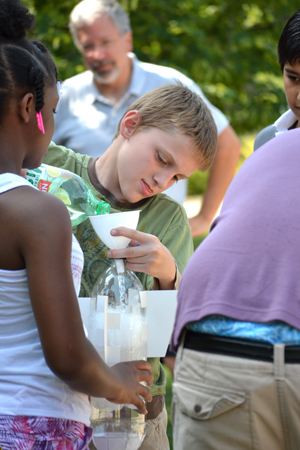
Campers prepare bottle rocket for launch as Bob supervises.
Having had a number of these experiences teaching high schoolers, Bob thought teaching these kids was very similar. "They were pretty darn close to the high school kids. I was surprised. I was expecting them to be far less able to do this work, but they did quite well at it."
In fact, Bob was quite impressed with their ability: "They were remarkably good at this. Every day I gave them a little refresher quiz on what they'd learned the day before; they were right on the money. On Friday, when Greg Elliott was there, I thought it was kind of cute, 'cause he kept asking them all of these questions, and they knew all of the answers. I was like, 'You're making me look good!' They didn't know any of that stuff on Monday. It was all pretty new to them."
Drew was also impressed with the campers' abilities. "There were definitely some kids who had loads of things to contribute in terms of things they'd already seen relating to our class, talking about how they saw this thing on YouTube, or they heard about this type of airplane that did this. It was great to see that they were already bringing their experiences into the class, as opposed to just sitting there and being fed the information and regurgitating it back. Although, they were pretty good at that too. When we were testing them on the last day at the radio-controlled demonstration, they knew what was going on."
Was the camp a success? Drew thought so. "The kids seemed enthusiastic. We didn't have anyone who was there for daycare purposes; they all wanted to learn. Some of them were absolutely amazing. They built beautiful models. And everyone had a model that flew to some extent in the end, so I consider that a success."
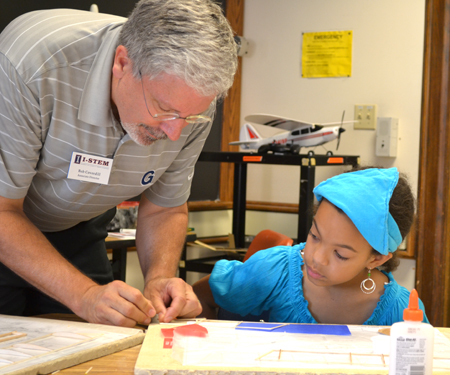
Bob Coverdill helps a camper with her model airplane.
Bob enjoyed the camp too. "I think it's a great opportunity for the kids," he shared. "This is fun stuff. This is stuff I'd like to see us do more of in I-STEM."
Will any of these kids end up as engineers? Bob thinks so.
"I would think that there's a big chunk of that class that's destined to be engineers or scientists. Just getting to talk to them a little bit, just their general and inquisitive nature, they seem pretty inclined to that. So I wouldn't be surprised."
Bob also shared that some of the kids might choose engineering as a career because their parents are engineers—like Drew did. Following in his father's footsteps, he also became a mechanical engineer, getting his Bachelor's and his Master's degrees at Illinois. Was his dad working nearby in Mechanical Sciences and Engineering while he was doing all of this? Says Drew, "Yes, he was. Close by."
Possibly because it wasn't that long ago that Drew was studying for his own engineering degree, he knows there's a lot of hard work involved in becoming an engineer, but hopes that a bit more exposure to some of the cool things about engineering might keep these kids interested.
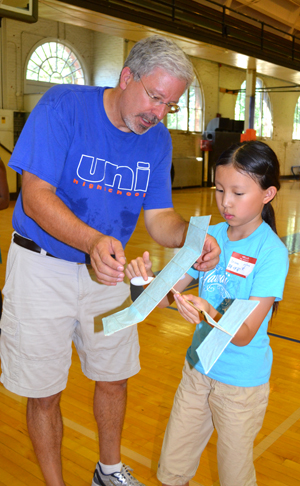
Bob Coverdill helps young camper prepare her glider for flight.
"I thought it was a really good activity for the week. I hope that some of them might come back next year, if there's a camp similar to this. Hopefully we'll have some new things for them to do, and it'll be a little different. I think it really could keep them interested. There's a lot of things they need to do that aren't so fun, from a kid's perspective, before they become an engineer and learn how to build airplanes and make rockets. Hopefully, seeing that future and 'These are the cool things you can do' will get them there."
Bob was already looking forward to next summer's camp too; he talked about maybe expanding it a bit, or possibly addressing water quality or bridges and structures.
When given one final opportunity, with this reporter practically begging for some "juicy stuff" regarding what it was really like working with dad, Drew didn't budge: "Just fine. I'm the good kid."
Author: Elizabeth Innes, Communications Specialist, I-STEM Education Initiative
Photographs: Elizabeth Innes, Christy Glaze, and Philip Johnson, I-STEM Education Initiative
More: Summer Camp, I-STEM Initiatives, Illinois Legacies, K-6 Outreach, 2012













.jpg)
















